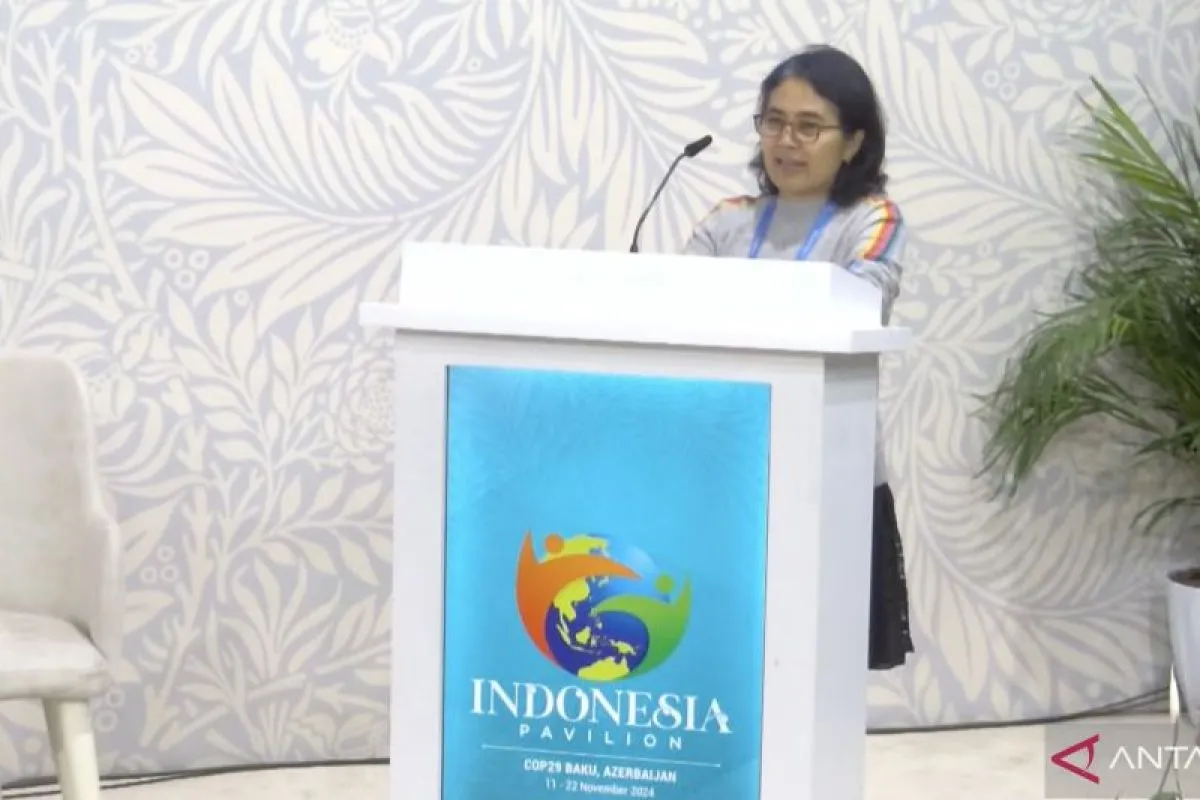Live Streaming
Program Highlight
Company Profile
November
Indonesia highlights role of marine sector to tackle climate change
Written by Ahmad Faisal

Screenshot - Environment Ministry's Director of Climate Change Mitigation Yulia Suryanti delivers a statement during a discussion at the Indonesian Pavilion of the 29th UN Climate Change Conference (COP29) in Baku, Azerbaijan, on Friday (Nov 15, 2024). (ANTARA/Prisca Triferna)
VOI News, Jakarta: Climate Change Mitigation Director at Indonesia's Environment Ministry, Yulia Suryanti, emphasized that her nation recognizes the maritime sector's crucial role in combating climate change, particularly given the substantial blue carbon potential within Indonesia's marine ecosystems.
"It is very important to identify the negative impacts of climate change on the sea and coastal ecosystems and limit their impacts through emission reductions, adaptation, as well as continuing to conduct research and effective marine management," she stated during a discussion at the Indonesian Pavilion of the 29th UN Climate Change Conference (COP29) Azerbaijan on Friday as quoted by Antara News Agency (15/11/2024).
She remarked that climate change adaptation and mitigation steps in the marine sector and coastal ecosystems are deemed necessary, considering that both have an important role as a source of life for the surrounding communities.
Given Indonesia's plan to incorporate the maritime sector into the second Nationally Determined Contribution (NDC) to be issued next year, addressing climate adaptation and mitigation strategies for the marine sector and coastal ecosystems has become increasingly critical.
Suryanti referred to the 2015 Paris Agreement and the Katowice Climate Package as the result of the COP24 in Poland in 2018, which emphasized important elements in mitigation measures in the NDC and the role of coastal ecosystem conservation and restoration efforts related to bitumen carbon.
The role of the marine sector in handling climate change has shown progress since COP25 in Madrid, Spain, in 2019, which mandated discussion on the issue and was implemented in 2020.
"During Indonesia's G20 Presidency in 2022, priority issues in our sustainable climate working group discussed land-based and ocean-based actions to support environmental protection and address climate change," Suryanti remarked.
She said that various steps to raise the issue of the sea and coastal ecosystems showed Indonesia's focus on the marine sector in tackling climate change and supporting the inclusion of the sector in climate targets and long-term strategies.
In addition, Indonesia recognizes the ocean's role in regulating the mechanism of carbon economic value as stated in Presidential Regulation No. 98 of 2021 concerning the Implementation of Carbon Economic Value for the Achievement of Nationally Determined Contribution Targets and Control of Greenhouse Gas Emissions in National Development.
"It shows that the ocean sector is one of the potential sectors in the mitigation element and not only adaptation, which was mentioned in our first NDC in 2016," she concluded.
November
Indonesia and UK explore plan to strengthen legal cooperation
Written by Ahmad Faisal
Law Minister Supratman Andi Agtas (right) with the British Ambassador to Indonesia, Dominic Jermey, in Jakarta on Thursday (November 14, 2024). (ANTARA/HO-Law Ministry/rst)
VOI News, Jakarta: Law Minister Supratman Andi Agtas explored the potential to strengthen legal cooperation with the British Ambassador to Indonesia, Dominic Jermey, during a meeting on Thursday.
As quoted by Antara News Agency on Friday (15/11/2024), both agreed to strengthen bilateral cooperation in the legal field, especially in terms of corruption eradication, law enforcement, intellectual property protection, and human resources development in the legal sector.
"Some of our priorities include the plan to implement the new Criminal Code (KUHP), intellectual property protection, and bureaucratic reform in the legal field," the minister informed in a statement issued by his office on Friday.
Meanwhile, Ambassador Jermey welcomed Indonesia's initiative to reform the legal system and offered cooperation in fields such as the criminal legal system, democracy, and child protection.
"We are open to exchanging ideas on the criminal legal system and democracy perspectives," Jermey said in the statement.
He also drew attention to the death penalty policy implemented in Indonesia, especially for foreign nationals involved in serious crimes.
According to him, both countries should maintain communication in handling such cases to ensure a fair process based on human rights standards.
There must be room for further dialogue regarding the implementation of the death penalty, especially in the case of British citizens facing such a sentence, he added.
At the end of the meeting, he expressed support for Indonesia's efforts to become a member of the Organisation for Economic Co-operation and Development (OECD).
OECD is an international organization headquartered in Paris, France. It was founded in 1961 to encourage global economic and trade progress.
Responding to Ambassador Jermey's request, Agtas said that the death penalty policy in Indonesia will be implemented strictly based on applicable laws, including provisions in the new Criminal Code.
He added that the Indonesian government remains committed to consistent national law enforcement and expressed the hope that all countries will respect Indonesia's legal policies.
"The death penalty will be based on certain parameters regulated in the implementing law of the Criminal Code that is currently being drafted," he explained.
November
Japan Anticipates Tough Challenge from Indonesia as World Cup Qualification Nears
Written by Daniel
November
Flights to Bali Resume After Volcanic Eruption Disruptions
Written by Daniel


